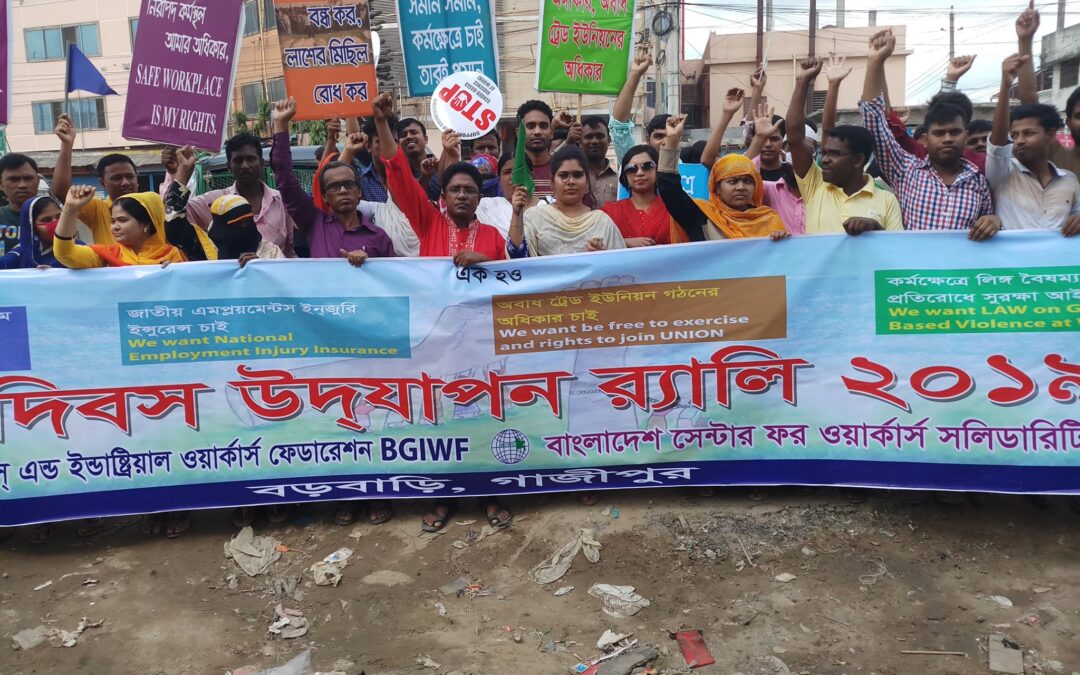Over a 25-year career, Shahidul successfully mobilized thousands of workers to join trade unions and empowered them to represent their co-workers as factory-level leaders. As a young man he experienced the grueling reality of work in a garment factory. Overworked and underpaid, and despite the risk of management reprisal, Shahidul decided to take action to build a better future for himself and workers like him by joining the Bangladesh Independent Garment Workers Union Federation (BIGUF) in the late 1990s.
Shahidul learned the ropes of union organizing as a participant in the Solidarity Center’s three-year organizing internship program, enhancing his skills to build worker power. Subsequently, he joined the Bangladesh Garment and Industrial Workers Federation (BGIWF), rising to the rank of president of the Gazipur District Committee. His influence extended to Gazipur, Rampura in Dhaka, and Narayangonj District, where he facilitated the formation of numerous factory-based trade unions, empowering workers to raise their voices for better wages and working conditions. As a trained paralegal of the Solidarity Center, he championed workers in claiming wages and benefits wrongfully denied by their employers. His remarkable ability to motivate and mobilize workers, collaborate with diverse stakeholders and navigate government processes significantly impacted the Bangladesh labor movement.
How did it come to this? Lack of accountability, fear and repression
Shahidul Islam was killed outside Prince Jacquard Sweaters Ltd., a factory producing for buyers in Europe and North America, and a member of the Bangladesh Garment Manufacturers and Exporters Association (BGMEA). Prince Jacquard did not yet have a trade union, though Shahidul’s federation, BGIWF, had started supporting workers to organize not long before his death.
The global garment supply chain is notorious for its exploitation, sourcing from low-wage, minimally regulated countries where factories are rife with wage theft, union busting, forced overtime and other abuses. Multinational fashion brands outsourcing work overseas exercise economic power over suppliers—often under threat of yanking orders and moving production to more compliant factories—and make demands that lead to worker abuse but boost the brand’s bottom line. At the same time, these companies claim a hands-off relationship with suppliers in regard to workplace safety and basic worker and human rights, often hiding behind the façade of “corporate social responsibility” programs and audits. Indeed, Prince Jacquard Sweaters Ltd. had undergone outside audits by two different firms, Amfori and Sedex.
Organizing an independent, democratic union that can represent the rights of workers and help them negotiate with their employers over issues like wage and benefit payments, can be a dangerous endeavor in Bangladesh. Once organized, the trade union registration process in Bangladesh is complicated, time consuming and plagued by corruption and interference from employers and their powerful associations. Workers regularly face unfair labor practices, such as illegal terminations, threats, harassment and violence. As in the case of Shahidul Islam, it is not uncommon for employers to hire local musclemen or mercenary members of management-dominated “yellow” unions to attack workers and organizers to prevent them from exercising their right to freedom of association.
In fact, in the absence of due process for resolving collective disputes between workers and employers, efforts by workers to collectively stand up for their rights are often ignored or met with retaliation. Mere months after Shahidul’s murder, four more workers lost their lives and many more were severely injured during the 2023 workers’ protests for a fair wage. This calls into question the reports about progress on freedom of association in Bangladesh.
Meanwhile, the majority of global brands and buyers sourcing from Prince Jacquard Sweaters have remained unresponsive to repeated outreach by labor rights organizations calling on them to provide compensation to the family of Shahidul Islam, while those who did respond deny responsibility.

